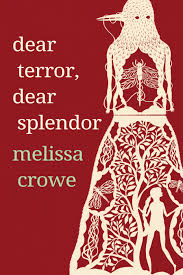 “As Far As Wishing Goes”
“As Far As Wishing Goes”
Review by Cammy Thomas
Melissa Crowe teaches in and runs UNC Wilmington’s MFA Program. Author of two chapbooks, Cirque du Crève-Coeur, and Girl, Giant, she has published widely, and is coeditor of Beloit Poetry Journal. This is her first full-length collection.
Crowe grew up in Presque Isle, Maine, very far north, in a large, complicated, working-class family. Food was sometimes scarce, and quite a few people lived on the edge of hunger, violence, addiction. But there was also connection, and love. This powerful book progresses chronologically, beginning in childhood and extending to her own child’s 18th birthday. The early poems tell unsettling stories about uncles’ car wrecks and unadvisable girlfriends, about eating a desperate kind of food, “paste of pig’s head and onion,” “government cheese in waxy orange blocks” (5). In “Minimalist’s Manifesto,” the speaker was hungry enough at one point to “eat noise/ and air and light.” But even in this difficulty, the language itself comes to the rescue. Here’s that last quote, in context:
I don’t eat
rabbits. I eat noise
and air and light.
Or I eat the silent,
moonless night.
Whatever there is, I’m
alright. Whatever there
isn’t. Alone I carve
each craving to its bone. (20)
The short lines, and the steady rhymes give us a structure that leavens the misery of that hunger. The internal rhyme (alone/bone), and sight rhyme (carve/craving) is also typical in her work, helping the difficult become beautiful. For Crowe, language has recuperative power, even if it can’t completely heal.
Later in the book, Crowe writes about her family trying to help her addicted brother. The sounds of “Still Life with Geese and Oxycontin” give shape and resonance to the family’s struggle:
Brother, you cried. We rose,
and rise, at least as far as wishing goes
(although you strut and stagger, steal
and stick around). So like our own, your ghosts,
your hollow honking song. We can’t let go.
Neither can we stay, hover still,
abide your hungry cries. (69)
Rhyme of all kinds (rose/goes/ghosts/go, cried/rise/abide/cries, hollow/go), alliteration (strut/stagger/steal/stick, hollow/honking/hover/hungry), and a rough five beat line give a strong, forward motion to this terrible story. It’s sad that “we can’t let go,” but also a sign of love, commitment. The musical language holds the world together, no matter how shattered.
This refusal to disconnect, to look away, informs the middle of the book, which focuses on pregnancy, childbirth, and the child’s growth. “Postnatal Epithalamium,” focuses on the choice many mothers have to make each moment between tending to a hungry baby and connecting with a loving husband. The epithalamium, a ceremonial wedding song, is part of what keeps a pair together.
I’m learning why
we need ceremony, words to remind us how to get through
what we once thought would be easy. Married as I am
to her hunger, I can still say this to you: I do. (44)
The rhyming in the last line (to/you/do) enacts the incantation that helps us “get through,” extends love to her husband, and confirms the importance of the ceremony that connected them, especially when that connection is hard to maintain. Language is about ordering and controlling that which we cannot really order or control. But our attempts create art that enables us to memorialize our unknown uncles, our failings, our tiny children, our commitments. Art can embody and present our striving, our resistance to fear.
As her daughter grows up, the speaker thinks of all the possible horrors. In the book’s title poem, the speaker addresses both terror and splendor simultaneously, because they arrive together, always. Her fears for her child bloom out, but the love she feels helps her bear those fears. She worries, as do all parents, about whether her child is still breathing. The last two words of this poem might be our daily gratitude:
…and if I can’t see in that near-dark her torso
rise and fall, I lean in and listen for her breath.
I’ve heard it every time so far. (79)
Dear Terror, Dear Splendor by Melissa Crowe
U of Wisconsin, 2019, $14.95 [paper]
ISBN 9780299321444
Cammy Thomas’ book, Cathedral of Wish, received the 2006 Norma Farber First Book Award from the PSA. A fellowship from the Ragdale Foundation helped her complete her second book, Inscriptions (2014). Her newest collection, Tremors, is forthcoming in 2021. All are published by Four Way Books. She lives in Lexington, Massachusetts.
